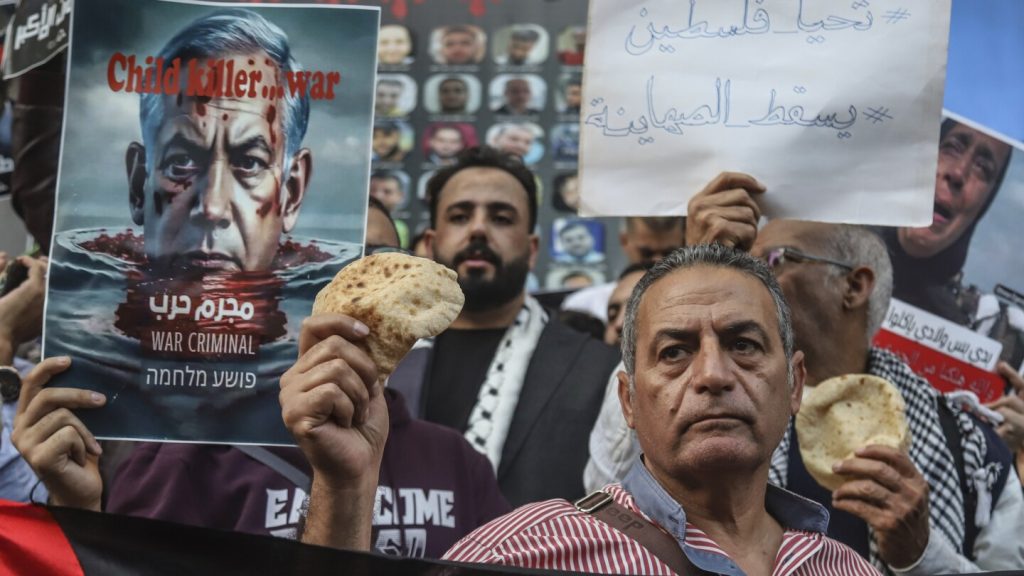The Egyptian government recently arrested 10 activists who participated in a pro-Palestinian protest in Cairo, where they accused the government of contributing to the siege of Gaza and called for the expulsion of the Israeli ambassador. The government has condemned Israel’s campaign in Gaza and has been involved in efforts to broker a cease-fire between Israel and Hamas. However, public protests are largely banned in Egypt, and criticism of the country’s ties with Israel is considered highly sensitive. The activists were arrested at their homes and charged with spreading false information and joining a terror group, which is often used against government critics.
Critics in Egypt have called for the government to overturn a 2007 agreement that grants Israel the right to inspect convoys entering Gaza through the Rafah border crossing. They argue that this agreement has allowed Israel to restrict the flow of humanitarian aid to Gaza’s 2.3 million Palestinians. The activists who were arrested during the protest were ordered to be detained for 15 days while investigations are carried out. The charges of spreading false information and joining a terror group are commonly used against critics of the government. Since the Muslim Brotherhood was declared a terrorist organization in 2013, after President Mohammed Morsi was removed from power, authorities have cracked down on political dissent and banned protests.
Since the outbreak of the Israel-Hamas war on October 7, Egyptian authorities have arrested dozens of pro-Gaza protesters. The rights group Egyptian Initiative for Personal Rights issued a report detailing the arrests and crackdown on protests related to the conflict. The Egyptian government’s role in trying to negotiate a cease-fire between Israel and Hamas has been complicated by the ban on public protests and criticism of its relationship with Israel. The activists who were arrested for participating in the pro-Palestinian protest face charges that are often used to suppress dissent and stifle opposition to government policies.
The Egyptian authorities have been facing criticism from human rights organizations and activists for their crackdown on protesters and critics of the government’s policies. The arrests of individuals participating in pro-Palestinian protests highlight the challenges faced by those who speak out against the government’s support for Israel and its role in the conflict in Gaza. The government has faced growing pressure to address the issue of the humanitarian crisis in Gaza and to allow for more aid to reach the Palestinian population. However, the restrictions on public protests and the suppression of dissent make it difficult for activists to push for policy changes and hold the government accountable for its actions.
The activists who were arrested during the pro-Palestinian protest in Cairo have become symbols of the government’s crackdown on dissent and criticism of its policies towards Gaza. The charges brought against them are seen as a way to intimidate others from speaking out against the government’s support for Israel and its role in the conflict. The situation in Egypt highlights the broader tensions in the region over the Israeli-Palestinian conflict and the challenges faced by those who seek to advocate for Palestinian rights and criticize government policies that support Israel. The crackdown on activists and protesters in Egypt raises concerns about freedom of expression and political dissent in the country.
As the conflict between Israel and Hamas continues to escalate, the situation in Egypt highlights the challenges faced by those who seek to advocate for Palestinian rights and criticize government policies that support Israel. The arrests of activists participating in pro-Palestinian protests demonstrate the government’s efforts to suppress dissent and prevent public criticism of its role in the conflict. The crackdown on protesters and critics reflects a broader trend of restrictions on freedom of expression and political dissent in Egypt. Human rights organizations and activists continue to call on the government to respect the rights of protesters and allow for more open dialogue on issues related to the Israeli-Palestinian conflict and the humanitarian crisis in Gaza.


